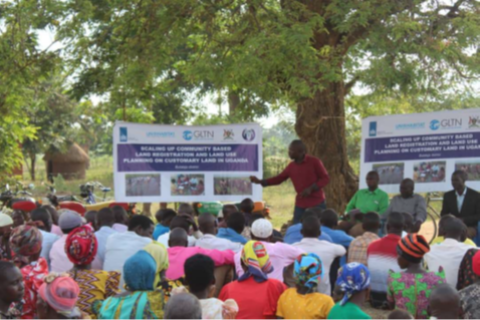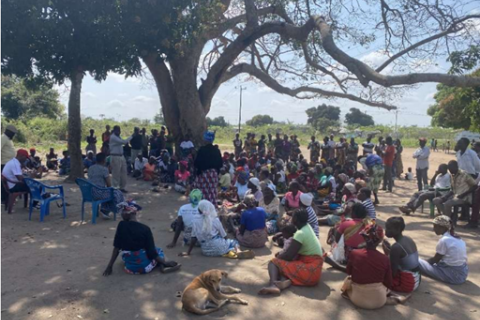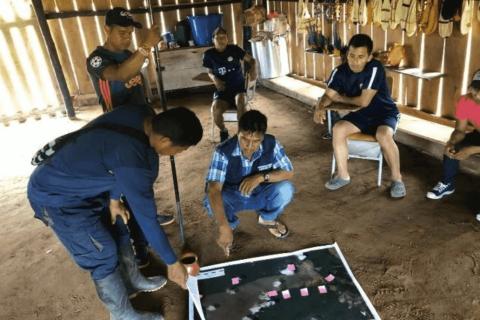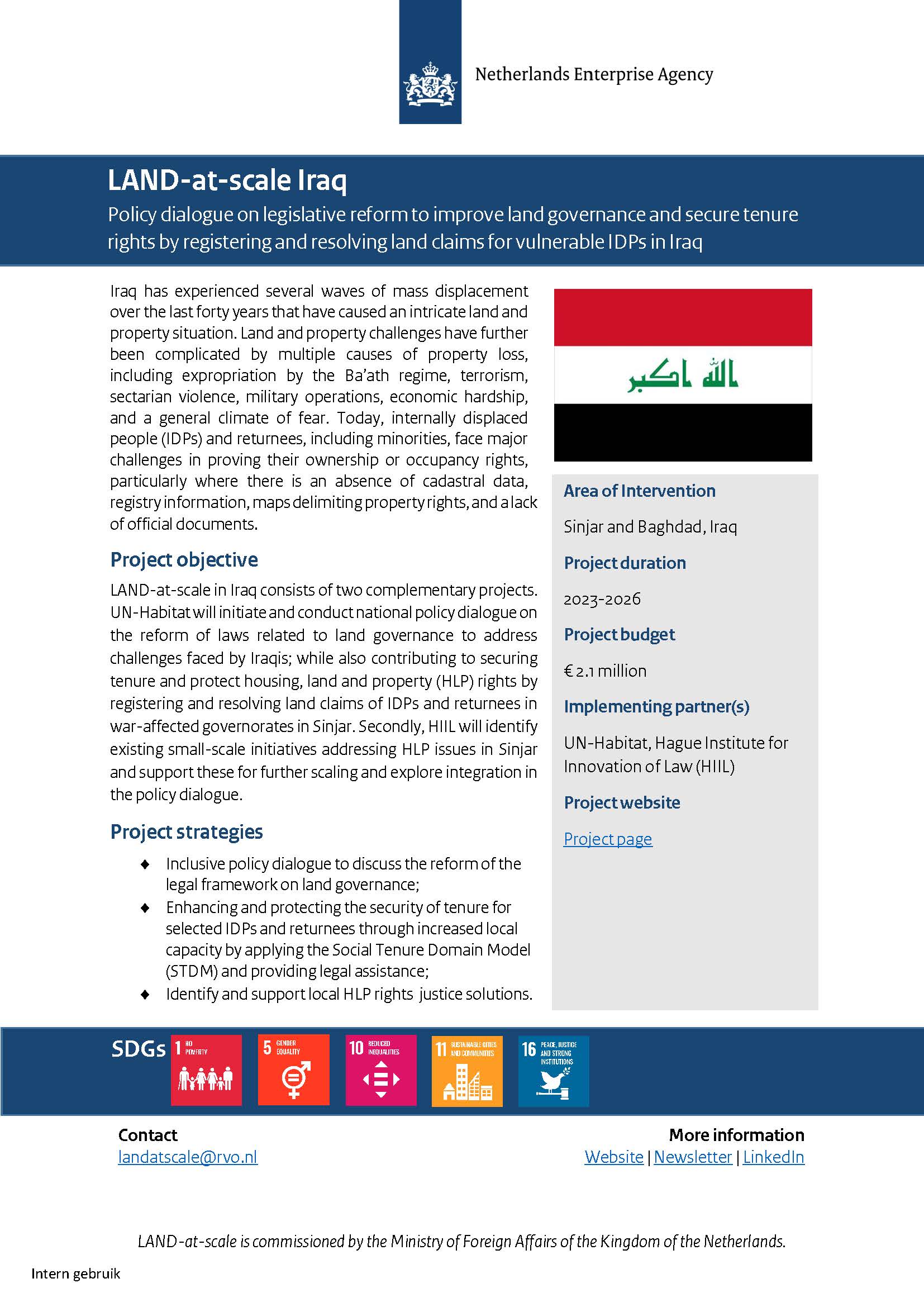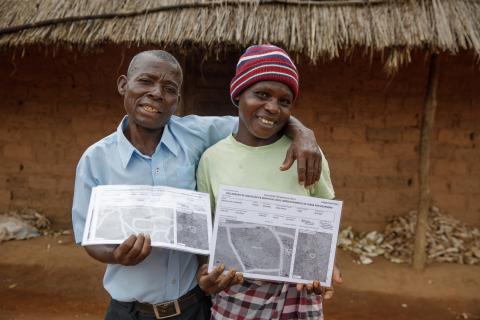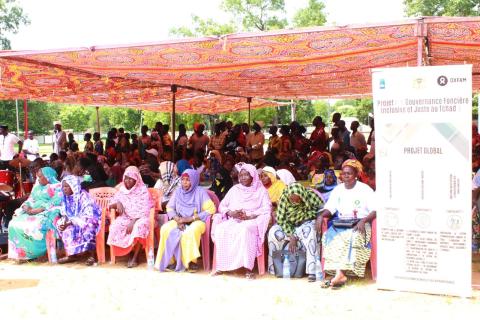
Topics and Regions
Programme advisor at RVO for the LAND-at-scale programme
Details
Affiliation:
Location
Contributions
Displaying 11 - 20 of 25Understanding the link between Climate & LAND-at-scale country projects - Community-Based Approach on Wetland Management Planning in Butaleja District Uganda
As part of a scoping study titled Land Governance for Climate Resilience: A review and case studies from LAND-at-scale projects headed by Richard Sliuzas, Emeritus Professor, University of Twente, GLTN dove into the links between climate and land governance in the ‘’Scaling up community-based land registration and land use planning on customary land in Uganda’’ project. This case study highlights experiences from the community-based wetland management planning approach in Butaleja, Uganda, focusing on how the approach is addressing land governance issues and contributing to community climate resilience.
Understanding the link between Climate & LAND-at-scale country projects - The nexus between land governance and climate change, Búzi District, Sofala Province, Mozambique
As part of a scoping study titled Land Governance for Climate Resilience: A review and case studies from LAND-at-scale projects headed by Richard Sliuzas, Emeritus Professor, University of Twente, CTV explored the links between climate and land governance in the LAND-at-scale project “Scaling Community Legal Literacy, Land Rights Certification and Climate Resilience in Mozambique”. This case study focusses on experiences from the Búzi District, where Cyclone Idai (March 2019) showed the need for proactive interventions in the land sector aimed at preparing districts and local communities to face and plan for severe climatic phenomena and their impacts, but also the challenges at making this link explicit.
Understanding the link between Climate & LAND-at-scale country projects - Climate Change and Land Governance in the Indigenous Reserve Teofina La Arenosa, in Solano, Caquetá, Colombia
As part of a scoping study titled Land Governance for Climate Resilience: A review and case studies from LAND-at-scale projects headed by Richard Sliuzas, Emeritus Professor, University of Twente, Tropenbos Colombia dove into the links between climate and land governance in their project.
LAND-at-scale Iraq
This one-pager provides details on the LAND-at-scale project in Iraq. This project is implemented by UN-Habitat and The Hague Institute for Innovation of Law (HIIL), and financed by the Ministry of Foreign Affairs via the Netherlands Enterprise & Development Agency (RVO).
LAND-at-scale Burkina Faso Scaling up Land Governance for Food Security
General
Burkina Faso is a country dealing with many crises: food insecurity, climate vulnerability and massive population displacement. Land plays a critical factor in all these crises. The fast-growing population, degradation of land as well as widespread migration of the population across Burkina Faso are putting rampant pressures on land. The country is heavily dependent on agriculture, which employs 80% of the population. Despite this, the country deals with significant food security issues. With emerging patterns of high temperatures and pockets of drought, the country is very vulnerable to climate shocks. As is observed in many crises, vulnerable groups are hit hardest by the consequences. Women and youth particularly, suffer disproportionality. They suffer from marginalization through customary practices, which leads to increased vulnerability to the factors above and has led to decreased access to land, or even land dispossession. Project objective To improve food security and the resilience of women and youth in the country by securing their access to land and by strengthening land governance and management practices. Project strategies - Raising awareness on land rights among relevant stakeholders; - Participatory registration of land titles with special reference to women and youth; - Optimizing land management practices of secured land of women and youth to address challenges related to land degradation and/or food insecurity; - Monitoring and learning on the experiences of the other components and formulating recommendations for more sustainable land governance.
LAND-at-scale Palestinian Territories Improving land governance for Palestinian farmers
Palestinian farmers in the West Bank mainly engage in low intensity agriculture. Despite great agricultural potential, the prospect of losing access to the land impacts negatively on the willingness of farmers to invest in sustainable agricultural intensification. Moreover, prior investments in agriculture could be under pressure when farmers do not have the documents to prove their tenure rights.
Women in particular are often unable to claim rights to the land they are using, importantly caused by discriminatory inheritance practices.
Project objective
The project aims to increase land tenure security for Palestinian farmers, with a strong emphasis on women, by improvement of the land governance system through the provision of technical and legal support. Attention will be given to formal and informal inheritance practices and raising awareness of women’s land rights.
Project strategies
- Embedding of land tenure security activities in earlier and ongoing food security projects, to create strong links between the two objectives.
- Provision of tailor-made technical and legal support to the project beneficiaries.
- Analysing existing inheritance practices, the impact on women’s access to land, and formulating recommendations to empower women.
Increased knowledge and awareness on the importance of land governance and women’s land tenure security.
- Increased resilience of farmers and women in exercising land tenure security.
LAND-at-scale Mali - Boosting local capacity to manage land conflict and protect customary rights
General
Land tensions and conflicts have always existed in Mali. Formal and customary law co-exist, causing a legal duality and ambiguity. Competition over land and natural resources is growing, and so are land-related disputes. Over 90% of smallholder farmers and pastoralists access land through customary tenure systems. Considering the large role customs play in rural areas, formal legal recognition of these customary rights is important. At the same time, the patrilineal customary systems undermine the position of women and youth. Land Commissions form a key structure in Mali and play a key role when it comes to customary land tenure management as well as land conflict resolution. However, only 30% of the communes have established a Land Commission, and their functioning is not monitored on a systematic basis. Project objective The goal of the intervention is to promote stability, food security, climate resilient agricultural development and natural resources management by strengthening security of access to and rights over land and natural resources, with special attention for inclusivity (especially women and pastoralists), through establishing and capacitating Land Commissions. Project strategies - Formalizing a coordination mechanism for building capacity towards sustainable, inclusive and transparent Land Commissions. - Providing a systematic approach for validating and sharing capacity building for Land Commissions, with a focus on mediation and inclusivity. - Setting up an independent monitoring and evaluation system of Land Commissions. - Establishing a network and exchange organization for Land Commissions.
LAND-at-scale Rwanda Towards a fair and robust land management and governance system connecting people for sus
General
The Rwanda Land Tenure Reform Program, launched in 2009, gained international attention by regularizing land tenure at an unparalleled scale. Over eleven million land parcels were demarcated, and eight million land titles were issued to their rightful owners. Despite this, the land tenure system still faces challenges. The land administration and information system (LAIS) does not yet sufficiently address social aspects, such as incorporating informal transactions and safeguards for women, or reducing high costs of participating. Land disputes remain common, and pressure on the courts to resolve these conflicts need to be decreased. These challenges undermine the legitimacy and proper functioning of land governance. This situation is further hampered by the effects of climate change on the country Project objective To improve and ensure sustainability of land registration and management systems and their implementing institutions for enhanced perceived and actual tenure security for the people of Rwanda. Project strategies - Institutionalize a (financially) sustainable land administration information and management system. - Implement sustainable, climate-resilient land use planning at national level. Implement a more just decision-making process by local mediators. - Strengthen academic capacity to assist in the further development of a fair and just land governance system.
LAND-at-scale Mozambique Scaling community legal literacy, land rights certification and climate resilience
General
Poverty in Mozambique is concentrated in rural areas and thus associated with a high dependency on agriculture and natural resources, including land. Mozambique has a legal framework recognizing this dependency through a progressive Land Law. However, main obstacles to the proper implementation of the law include communities’ lack of formalized land tenure, limited knowledge regarding land rights, low participation in decision-making among community members, and a lack of capacity among local government officials. The situation is further hampered by a severe impacts from climate change. Project objective The main objective of the current intervention is to increase community legal awareness and strengthen security of land tenure rights, creating capacity at local level to implement and leverage the progressive provisions of the Mozambican legal framework. The programme will contribute to community preparation to intervene in an informed manner in the land sector and will also contribute to the delimitation of community and individual land-use rights based on good faith occupation and customary rights, and their integration into the formal land system. To achieve these objectives, a large-scale campaign will be rolled out, across selected districts from all three regions of the national territory, with two main and interlinked interventions, namely: - Social preparation & legal literacy - Community land rights registration and certification
LAND-at-scale Chad- Land reform based on rapid evolution and present crisis
General
Chad is at the verge of an emerging land tenure crisis. As observed in many countries in Africa, formal and customary tenure systems overlap. Customary tenure systems, that generally prevail in rural areas, differ from region to region, with each its own needs and practices. Land conflicts are abundant, caused by degradation and transformation of land surfaces caused by climate change, as well as land investments by domestic investors with disputed legitimacy. Women, particularly, struggle in practice to obtain the same rights to land as men, even though country’s constitution enshrines gender equality. These land challenges play against a backdrop of a country in conflict. A land tenure crisis could lead to more disputes over land, weakened land productivity, uncontrolled urban development, and result in further social unrest of the country if not adequately addressed. Project objective The project aims to contribute to a more transparent and inclusive land administration system in Chad, especially for tenure insecure groups (women and youth), which creates security for communities to invest in sustainable income generating activities. Project strategies - Finalization of the Land Code: a review and rewrite of the content, combined with a multi-stakeholder validation workshop - Support to socio-economic land reform, with special attention for inclusion of women and youth, strengthening civil society organizations, capacity building on agricultural practices and dispute resolution mechanisms. - Improving the land registration system in N’Djamena by developing a blueprint of the current situation and roadmap towards the preferred future situation, together with the relevant government authorities in Chad.


